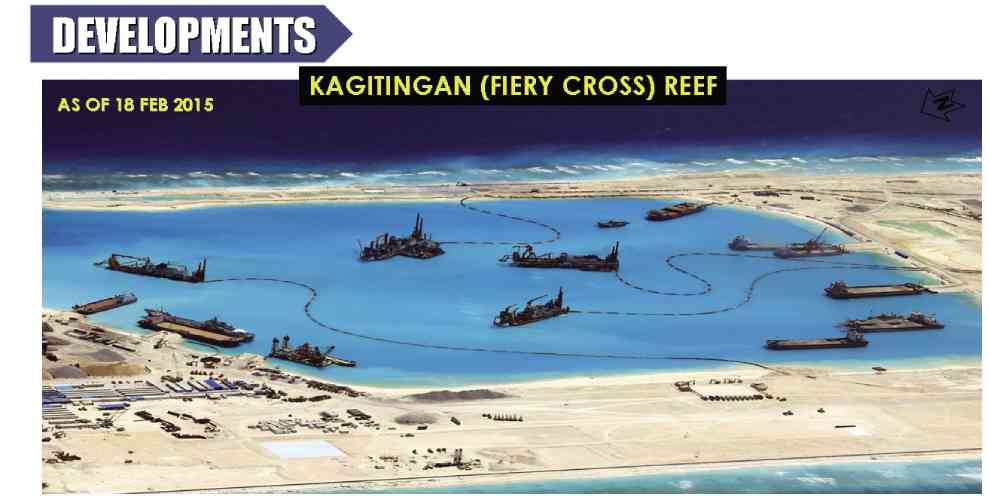
DISPUTED REEF Photos provided by the Center for Strategic and International Studies show Kagitingan (Fiery Cross) Reef (above) with a 3,125-meter-long airstrip built by China and reclamation work (right) going on on the reef in the Spratly archipelago also claimed by the Philippines and Vietnam. AFP
WILL they stay the legal course or surrender sovereignty and agree to a joint development with China in the disputed South China Sea?
Presidential candidates seeking to lead the country for the next six years must answer such questions as the Philippines faces China’s “creeping invasion” and rapid militarization in the South China Sea, the “gravest external threat since World War II,” Supreme Court Associate Justice Antonio Carpio said at a public lecture on Wednesday.
Speaking at the Philippine Social Science Center in Quezon City, Carpio said the candidates must lay down their plan for the territorial dispute, which threatens not just the country’s borders but also its fisheries, oil reserves and other critical resources within its exclusive economic zone (EEZ).
Candidates’ stand
The Philippines is awaiting a United Nations arbitral tribunal’s ruling on the case it had brought to invalidate China’s claim to 85.7 percent of the 3.5-million-square-kilometer South China Sea.
Manila aims to stop Chinese incursions into the Philippines’ territorial sea, EEZ and extended continental shelf.
“Presidential candidates must take their position with regard to the South China Sea dispute. If they are elected and they become President, and if this case is not yet decided, are they going to continue with the arbitration or withdraw the arbitration?” Carpio said.
“They must also be asked: If elected President, are they going to enter into joint development with China? Because the condition of China for joint development is [that] we concede sovereignty to them and they will give us 50 percent of resources within our EEZ,” he said.
Carpio said the other Southeast Asian claimants in the South China Sea—Brunei, Malaysia and Vietnam—had not acceded to the Chinese position, as it would mean surrendering sovereignty.
Carpio said the UN tribunal might release a ruling on the Philippine arbitration case “before the May elections or at least before the new President assumes office.”
“And once the new President assumes office, there’s already a decision, and if the decision says [China’s claims] are void [and that] we are entitled to a full [370-km] EEZ, then I don’t see any President giving that up,” he said.
Expressing optimism that the arbitral court would rule in favor of the Philippines, Carpio asserted the import of maintaining sovereignty over the West Philippine Sea, South China Sea waters within the country’s EEZ.
If China succeeds in taking over the disputed area, the Philippines will lose 531,000 sq km of maritime space in the West Philippine Sea, and sharing at least 1,300 km of common sea border, which is dangerous given China’s expansionist tendencies, Carpio said.
What if PH loses?
The prospect of the Philippines losing the case despite all evidence supporting it would mean no maritime or international law could settle the dispute at all, Carpio said.
“We don’t want that to happen. I don’t think that it will happen or the [UN] judges will be jobless, because there will be no law of the sea,” he said.
China has ignored the case and said it would not accept any ruling by the UN court.
To get China to respect the UN ruling, Carpio said the Philippines must get the world’s support.
He cited statements from the United States, Association of Southeast Asian Nations, European Parliament and Group of Seven (Canada, France, Germany, Italy, Japan, United Kingdom and the United States) urging China to respect the legal proceedings and comply with any award the United Nations would issue.
“We will sponsor a resolution [at the UN] General Assembly that China must comply, and we will get the support of all the countries in the world,” Carpio said.
He said the coming years would be critical, as China pressed its expansion in the South China Sea, building artificial islands with airstrips, radars and antiaircraft missiles.
Self-preservation
Carpio said China’s game plan was self-preservation.
“It wants all the resources—fisheries, oil, gas and mineral resources—in the South China Sea all to itself,” he said.
Asked if he believed China would go to war to defend its claims, Carpio replied: “China will not go to war because they no longer need to go to war to get what they want. All they have to do is to show up and intidimate us.”